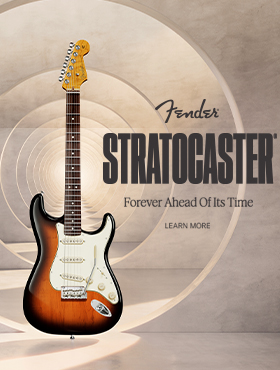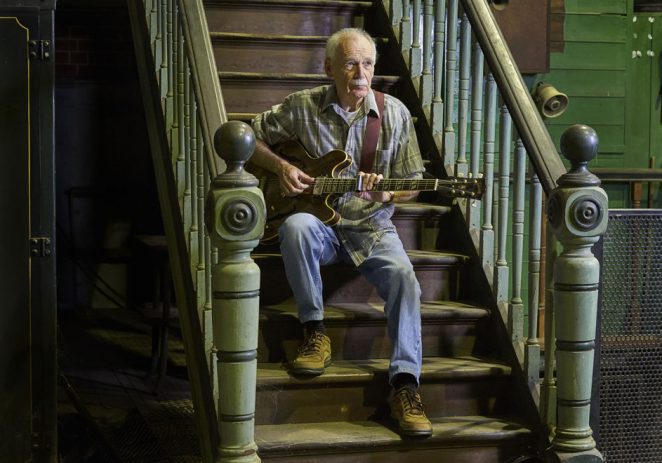
Metallica’s Kirk Hammett once said, “His slide playing kills me,” about Australian blues guitar legend Dave Hole’s fretboard mastery. UK guitar icon Gary Moore sought out Hole to join him on not one but two European tours, featuring 2 famous gigs at London’s Royal Albert Hall. In the early 90s, Bruce Iglauer, President of Alligator Records, the world’s most prestigious blues label inked Dave Hole as the label’s first and only non U.S. based signing. In 1991, Jas Obrecht, editor of Guitar Player magazine USA described Hole’s playing as, “Magnificent, staggering, almost beyond belief…”. Dave has has jammed with some of the world’s finest blues guitarists including Buddy Guy, Otis Rush and Albert Collins. In short, Dave Hole is a national treasure or certainly needs to be treated like one. He’s released ten exceptional blues guitar albums including a brand new self-produced record called Goin’ Back Down, which is released on April 27. More than any of Hole’s previous releases, Goin’ Back Down reveals a multifaceted side of the guitar icon that he rarely let’s us see. While the fire and brimstone slide playing is still there, we get a better overall picture of his songwriting prowess this time around. Prior to the album’s release, Australian Musician’s Greg Phillips spoke to Dave Hole about the creation of Goin’ Back Down.
I hear a lot of the old blues legends in your music but who were the main ones that really made an impact on you?
There’s Robert Johnson, Blind Willie Johnson, Son House, that early Mississippi blues. That’s all really important in my playing. It may not appear that way because that’s mainly acoustic and I play electric most of the time but I am heavily influenced by it, rhythmically and melodically. The other side of it is Chicago blues and my main one there is Elmore James being the slide king. Earl Hooker was a great slide player too … and Muddy Waters. Although I play mostly slide, another big influence are all three Kings, BB, Albert and Freddie.
You have jammed with Buddy Guy, Otis Rush and Albert Collins, to name a few. What do you learn from playing with guys like that?
While you’re jamming you don’t learn too much because you’re just trying to hang in there with those guys, they’re so amazing. Of course I have listened to those guys over and over, so I have learned a lot from their records rather than jamming on the day. I think you get a little bit of a vibe that helps when you are playing with people like that. It’s funny, Albert Collins was a lovely guy but it amazed me that he wasn’t as confident as I thought that he would be. He seemed a bit unsure about things, asking things like, ‘Does this amp sound alright?’ I know for a fact that he hated the sound of his own voice. I guess that’s the case with a lot of us. You would never know that from Albert’s playing because it is so confident and he was so amazing at what he did.
Do you fear for the future of the blues as the older guys die off?
I do fear for it a little bit. There are some good young guys out there. I don’t really fear for the blues per se but I lament that certain styles of blues are dying out. We were talking about your Elmore James, Muddy Waters, Howlin’ Wolf, the last vestige of that is Buddy Guy. You don’t hear that sound much now. We don’t sound like those guys did. We’ve got more of that Eric Clapton, Jimi Hendrix mixed in with the blues and we didn’t come off the farm in Mississippi, so it is different. The generation below me, what I would call the younger guys, they are different again. So I lament the fact that generations disappear. I suppose it happens with all music. I mean, how many big bands do you hear these days? I think the blues is in good hands with some of the younger guys and I have no doubt that it will survive. I mean Derek Trucks is an amazing player and in Australia, you’ve got Lloyd Spiegel, people like that who I regard as young guns.
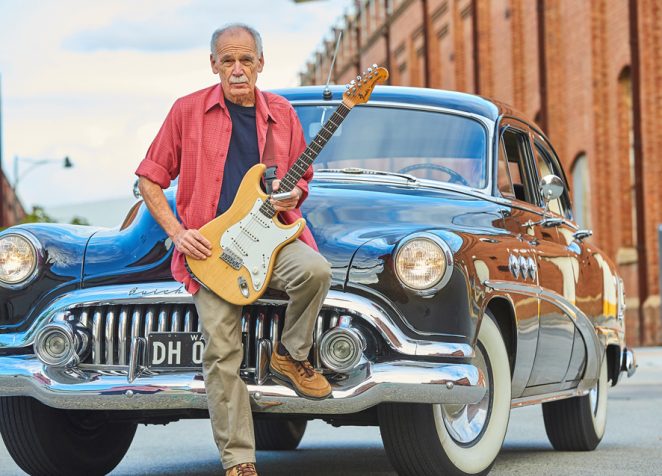
Goin’ Back Down is your 10th album. What have you learned about getting a good recorded guitar sound in the studio?
To put it in a nutshell, to get a good guitar sound when I am recording … I have to play pretty loud. You hear so many times that a little amplifier will sound like a big one when you record as long as you adjust the levels. I used both big and small amps on this record but my favourite sounds on it are the big ones, when I was cranking it. The small amps, even when they are turned flat chat, don’t sound like the 40 watt amps or whatever. For myself, what I have learned is that I need to move a bit of air in the room to get it to sound like it is meaningful.
Did you enjoy recording digitally?
Actually I did. I find it very interesting what can be done and I like learning stuff. I have used Pro Tools on other albums and watched engineers use it sitting down next to them. I do have some familiarity with the software but doing it yourself is a whole other ball game. Then you’ve got all the plug ins and simulated compression and EQs and that has to be learned too but I found it quite invigorating. I think because I did it over a period of time, I still got enjoyment out of playing the music. You kind of have to be careful when you put your technical hat on that you don’t forget that you’re an artist creating something. I can see good reasons why people might not want to do it the way I have, if you’re talking about having a live vibe and the energy and performance. I was able to get up in the morning and if I felt like playing, I’d put some stuff down. If I didn’t feel like it, I’d go and do something else.
Arrows in the Dark is a very different song for you. It’s a bit Brit pop. Was there a conscious decision with this album that you wouldn’t impose any rules of restrictions in regard to the kind of songs you recorded?
I write a hell of a lot of stuff. I’m sure many song writers are the same, where most of it you don’t end up using. I have always written songs which are not exactly in the blues genre. I grew up listening to Buddy Holly, and The Everly Brothers and of course The Beatles, so that is still a little part of my musical persona. When I write it doesn’t always come out bluesy. In past times, record companies have typecast me as a blues guy, which I am but you tend to put those other songs to the side and concentrate on the blues. My guiding overall principle with this album was that I would do whatever I wanted to do… make an album for myself and hope that people might like it. I permitted a couple of ballads to creep in … probably 2 or 3 songs I normally wouldn’t have included. I wouldn’t have taken them to mixing stage normally but I quite like these and think they probably give a rounder idea of what my whole musical personality is, it’s not just high energy slide guitar. I do have other things that I like to do.
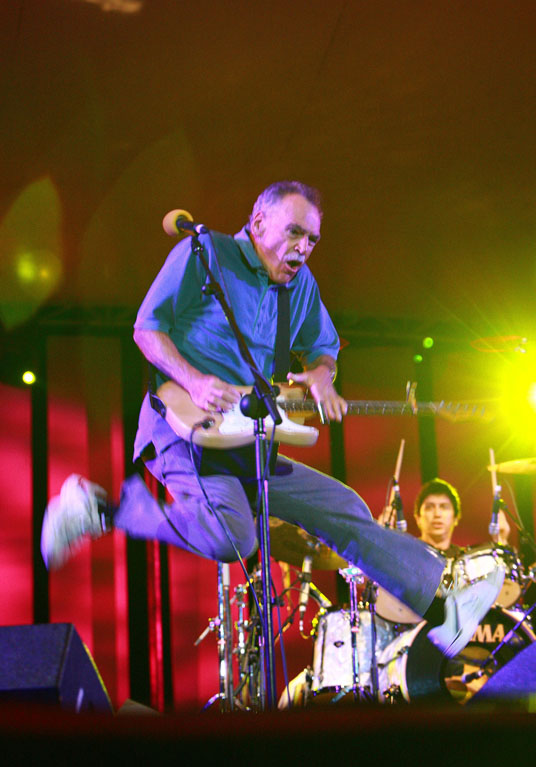 Tears For No Reason, the ballad is another one of those songs which is a different track for you. What inspired that song?
Tears For No Reason, the ballad is another one of those songs which is a different track for you. What inspired that song?
It is lyrically driven and if you listen to the lyrics, it’s really about depression. So many people have depression and it is my take on it. I don’t suffer from it myself but it was my take on trying to get into the head of someone who does and look at what it might be like to suffer from depression. So it was lyrically driven and then the descending chord sequence just came out when I was noodling around with the words. It just seemed obvious that it wasn’t going to be a blues song and it grew form that. I got the idea of using a nylon string acoustic, a classical guitar instead of a steel string or electric. Then I ended up putting strings on it as well. There’s a good friend of mine who is a cello player with the West Australian symphony orchestra and he came in and put some cello parts down to go with the synthesised strings to give it more of a real vibe.
Why is Goin’ Back Down the title track?
Originally the title track was going to be Stompin’ Ground, which is the first track on the album. Then Tommy Castro brought out an album called Stompin’ Ground about a month before I went into production with mine, so I had to find something else. Goin’ Back Down is like the echo of Stompin’ Ground at the end of the album. It is actually the same song continued, I broke it into two. It bookends the album.
Did you use many guitars on the album? Was it mainly your Gibson ES345?
The main one I used was the Strat, I used that on more songs than the 345. I have two of those, a red and brown one and they sound slightly different. I did also use an SG on a couple of things. There’s a National steel Reso-Phonic on one track, Measure of a Man. Apart from the outro, that’s all done on the Reso-Phonic.
Did you use many pedals?
The only one I used with any consistency was a Roger Mayer Axis pedal which is basically the old Fuzz Face. Roger Mayer was the guy who did all of the pedals for Jimi Hendrix. He modified the old Fuzz Face to suit Jimi and this one he has put out is based on the one Jimi used on the album Axis: Bold As Love. I used that quite a bit because it’s a really cool pedal. if you turn your guitar down, it is not distorted, it’s got this character to it and it cleans up. It’s quite a versatile pedal and I used it a lot. I used a compression pedal on quite a few things too, when I was using a quieter amp and wanted a bit more sustain.
Are your solos pretty much set in stone prior to the pressing record button or can they be quite different from take to take?
They are totally different. I am one of those guys that plays off the top of my head and don’t have an idea of what I am doing when I go into a solo, it’s what comes into my head. I’m really winging it when I solo. Having said that, If I do three takes of a solo, it is interesting and without being conscious of it, they do seem to have a similar form throughout the 24 bars or whatever. I will often just record three takes and use the best of the three or mix them if they fit together. They generally just fit together and I can take the best of one solo and mix it with another, so it seems that I am playing with some sort of pattern in mind but it is not a conscious thing.
Having spent three years making the album, was it difficult to know when it was done and let it go?
Yeah, that’s a really good point. It is hard to let go and I did let it go on a bit long in some regards and made lots of little changes without any real improvement. In fact you could probably argue that some of the songs peaked before the ones on the final mix. Yes, you can start fiddling around with it too much. It is hard to walk away and say that’s it when you are the one with total control over it. When you’ve hired a studio for two weeks it comes to the end you go, oh well that’s it. I think it was Sting who said that you never finish an album, you just abandon it.
Your tour begins on the 3rd of May. Are there any of these new songs that you are really looking forward to playing live?
Yeah, some of them are different to my normal blues songs. There are a couple of shuffles on there which are my bread and butter and they’ll get a play. Probably Stompin’ Ground will get a go, it will be an interesting one to try live. I’ll probably do 5 or 6 songs from the album.
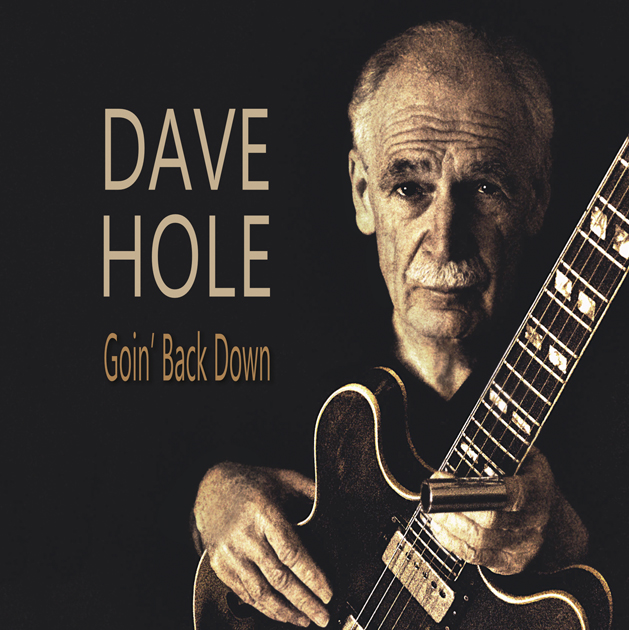 What happens after this tour?
What happens after this tour?
I may go to Europe but more than likely I will leave that until this time next year. Same with America, it’s a difficult one. It is such a big market and I am getting to the point where I am not as keen to slog around 52 states for 6 months of the year, which is what it takes to make it there. That’s where the guys who live over there have an advantage. I’m not sure what I’ll do with America. I am quite keen to play more in Australia over the next few years. I have been guilty of not performing enough in Australia. Over the 25 years since my first album I have placed a lot in America, and Europe because they are such big markets and you get drawn into it. Australia has always been like … can I squeeze in a couple of weeks and do a show in each city? It has been an after-thought and that’s a shame because I am Australian and its great fun playing in Australia. In a lot of ways its more relaxing, it’s home. Now that I am getting on, nearly 70 I feel I’d like to play more gigs closer to home.
DAVE HOLE TOUR DATES
THU 3 MAY BRASS MONKEY CRONULLA NSW
FRI 4 MAY THE BRIDGE HOTEL ROZELLE NSW
SAT 5 MAY THE HERITAGE HOTEL BULLI NSW
SUN 6 MAY WICKHAM PARK HOTEL NEWCASTLE NSW
FRI 11 MAY THE SPOTTED MALLARD BRUNSWICK VIC
SAT 12 MAY SATELLITE LOUNGE MULGRAVE VIC
SUN 13 MAY MEMO MUSIC HALL ST KILDA VIC
17 – 19 MAY BLUES ON BROADBEACH BROADBEACH QLD
SAT 26 MAY THE CHARLES HOTEL NORTH PERTH WA
TICKETS ON SALE NOW
www.davehole.com

